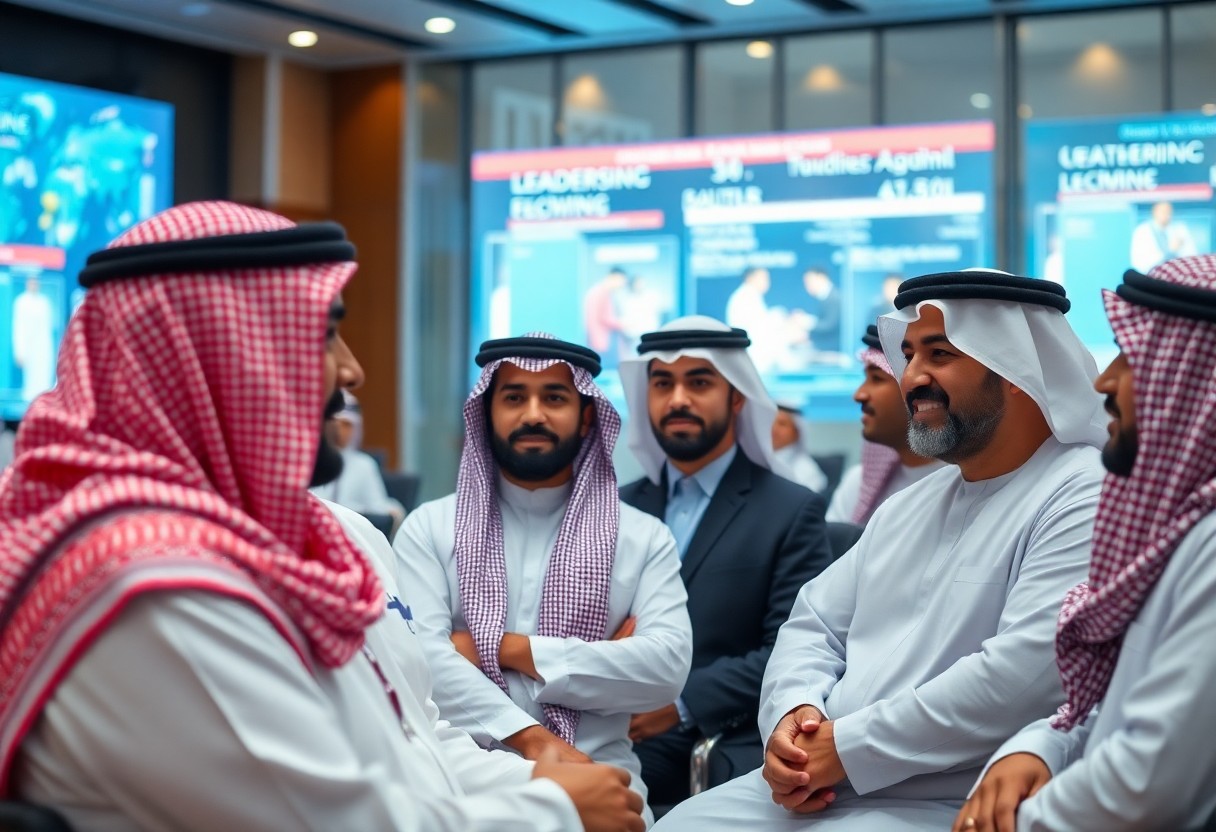Evolution in leadership across the Arab world reflects a landscape marked by historical shifts and cultural transformations. You will find that the rise of social media, activism, and democratization has significantly influenced leadership styles, pushing for greater accountability and transparency. Moreover, the ongoing challenges posed by political unrest and economic instability have forced leaders to adapt and embrace innovative approaches to governance. This blog post will guide you through the key trends and transformative moments shaping the future of leadership in this dynamic region.
Historical Context of Leadership in the Arab World
While the Arab world’s leadership landscape has undergone significant transformations over time, it is imperative to understand the historical context that shaped its evolution. The region’s rich tapestry of tribal alliances, religious influences, and socio-political dynamics laid the groundwork for contemporary leadership models, making it vital for you to grasp the historical narrative to appreciate today’s leaders fully.
Pre-Colonial Leadership Structures
Context plays a critical role when examining the pre-colonial leadership structures in the Arab world. Traditional governance often revolved around tribal affiliations and religious authorities, where leaders were chosen based on kinship ties, wisdom, and military prowess. This system fostered a unique form of leadership that emphasized communal consensus and the central role of faith, influencing how you perceive authority and governance in contemporary societies.
Colonial Influences on Leadership Dynamics
Influences from colonial powers significantly altered the leadership landscape in the Arab world, as foreign governments imposed new systems and challenged traditional authorities. The introduction of Western ideologies and administrative frameworks reshaped power dynamics, forcing local leaders to adapt to evolving political environments. As a result, a struggle between maintaining cultural identity and embracing modernization emerged, deeply impacting how you understand leadership today.
This struggle had profound implications for leadership dynamics. Colonial powers often dismantled established structures, replacing them with systems that prioritized political loyalty to colonial administrations over traditional authority. The disruption of communal consensus led to a fragmentation of leadership models, which in turn created a reliance on external validation. You may notice that this historical disruption still reverberates through current leadership challenges in the region, with leaders grappling to balance heritage and modern governance.
Modernization and Its Impact on Leadership
If you examine the landscape of leadership in the Arab world, you will notice that modernization has played a significant role in shaping new paradigms. The infusion of technology and exposure to global perspectives has led to a shift towards more inclusive, participatory forms of governance. Traditional authority structures are being challenged, paving the way for visionary leaders who embrace change, innovation, and adaptability, reflecting the evolving expectations of their societies.
The Rise of Nationalism
Below the surface of modernization lies the resurgence of nationalism, which has profoundly influenced leadership dynamics in the Arab world. You can observe how leaders are increasingly aligning their visions with national identity and cultural heritage. This rise fosters a sense of unity and purpose while also encapsulating the complexities of regional aspirations and challenges, often stirring emotions tied to cultural pride and historical narratives.
The Role of Education and Social Movements
Leadership plays a transformative role as education and social movements drive societal change. You will find that as educational opportunities expand, individuals are empowered to challenge the status quo, promoting social justice and political engagement. This growing awareness cultivates a new generation of leaders committed to addressing issues such as inequality and governance, enhancing civic responsibility across the board.
Movements for social change are proving to be catalysts in shaping future leaders. As you look into the heart of these movements, you will notice they amplify the voices of marginalized communities, emphasize education, and push for political reform. The interplay between these forces creates a fertile ground for leadership that is not just focused on authority but also on accountability and community engagement. Such developments can either empower a new wave of leadership or provoke social unrest, making it necessary for leaders to find a balance between popular demands and governance.
The Influence of Technology on Leadership
Any modern leader in the Arab world must navigate the complex landscape of technology, which significantly affects their approach to governance. As technology advances, it provides innovative tools for communication, decision-making, and stakeholder engagement. Leaders today are expected to leverage these tools to enhance their effectiveness and maintain relevance in an ever-evolving world.
Social Media and Political Mobilization
To understand the transformative impact of technology, consider how social media has become a powerful instrument for political mobilization in the Arab world. Platforms like Twitter and Facebook enable rapid dissemination of information and can galvanize communities around shared causes, often leading to increased civic engagement and activism.
Digital Governance and Transparency
Below the surface of traditional governance, digital solutions promise enhanced transparency and accountability in leadership. The rise of e-governance initiatives empowers citizens by allowing them access to governmental processes and decisions, fostering a culture of openness and participation in the democratic process.
Indeed, the shift towards digital governance in the Arab world correlates with a push for greater transparency and accountability in leadership. This transformation fosters an environment where citizens can readily access information about government activities and policies, leading to a more engaged populace. However, the journey also presents challenges; the reliance on digital platforms can expose vulnerabilities in cybersecurity. Therefore, while the potential for innovation and improved governance is immense, leaders must also prioritize strategies to protect against potential digital threats, ensuring that this transition enhances rather than hinders public trust.
Gender and Leadership in the Arab World
To understand the dynamics of leadership in the Arab world, it’s important to recognize the impact of Islamic principles and tribal values. Evidence from Jordan highlights the role of gender in shaping leadership narratives. While traditional roles have constrained women’s participation in leadership, emerging trends indicate a gradual shift towards inclusivity and equal representation, urging organizations to adopt more equitable practices that empower women in leadership roles.
Women in Positions of Authority
Leadership positions for women in the Arab world are gaining ground, exemplified by increasing representation in government and corporate sectors. As more women defy stereotypes and take charge, they create pathways for future generations, establishing a robust framework for female empowerment and active participation in socio-economic development.
Challenges Faced by Female Leaders
For many women leaders, navigating the path to authority presents numerous challenges, particularly in a traditionally male-dominated landscape.
For instance, female leaders often grapple with systemic biases that challenge their credibility and authority. They face various hurdles, including cultural resistance from communities holding deeply rooted beliefs about gender roles. Additionally, many experience limited access to networks and resources that are crucial for their career advancement. These challenges can lead to feelings of isolation, making it imperative for you as a supporter of gender equity to advocate for policies that promote a more inclusive environment for aspiring female leaders.
Contemporary Leadership Challenges
Your understanding of leadership in the Arab world must consider the multifaceted challenges leaders face today. With rapidly changing political landscapes and the demands of globalization, leaders are tasked with navigating both traditional norms and modern expectations. This evolution brings to light the urgent need for adaptive strategies that resonate with diverse populations while promoting stability and growth in a complex environment.
Economic Crises and Governance
Beside the political dimensions, economic crises have deeply affected governance structures in the Arab world. Leaders must tackle issues like unemployment, inflation, and resource management, while ensuring sustainable development and social equity. These challenges demand innovative solutions and strong governance frameworks that can restore trust and promote resilience in the economies.
Regional Conflicts and Political Instability
Instability in the Arab region often stems from longstanding regional conflicts that have profoundly impacted leadership dynamics. As these issues persist, they challenge your leaders to engage in diplomatic efforts and foster dialogue among diverse groups. The effectiveness of leadership in this climate is vital for promoting peace and unity, as well as addressing the needs and aspirations of the population.
Plus, understanding the effects of regional conflicts on political stability is crucial for grasping contemporary leadership challenges. These conflicts not only lead to significant loss of life but also create profound disruptions in economic systems and infrastructures. Leaders are often faced with addressing the urgent demands for humanitarian assistance while simultaneously striving for long-term political solutions. Additionally, the rise of non-state actors complicates the traditional leadership approach, making negotiation and collaboration crucial tools for any leader aiming to foster stability and progress within their nations.
Future Trends in Arab Leadership
For the Arab world, the future of leadership is poised for significant transformation, embracing innovation and inclusivity. As globalization and digital advancements continue to reshape societies, leaders will need to adopt flexible strategies that resonate with diverse populations. This evolving landscape encourages collaboration and a stronger focus on sustainable development, ensuring that leadership adapts to the challenges of the 21st century.
Emergence of New Leadership Styles
By recognizing the need for adaptability, new leadership styles are emerging in the Arab world. These styles prioritize transparency, collaboration, and a commitment to ethical practices. You will likely see leaders who encourage open dialogue and prioritize emotional intelligence, fundamentally reshaping traditional hierarchies for better inclusivity and engagement.
The Role of Youth in Shaping Leadership
The engagement of youth is fundamental in influencing leadership paradigms across the Arab world today. Their fresh perspectives and innovative ideas are driving a shift towards more participatory governance. As they become increasingly active in political, social, and economic spheres, they demand accountability and representation, ensuring their voices are heard in shaping the future.
Leadership in the Arab world is being redefined by the active participation of youth, who are not just passive observers but vital contributors to the leadership conversation. This new generation is savvy, aware, and determined to challenge the status quo. They prioritize values like social justice and environmental sustainability, pushing leaders to adopt more transparent and responsible approaches. Your involvement in community and political initiatives empowers you and your peers, establishing a more representative framework that values collaboration and innovation.
To wrap up
With this in mind, you can appreciate how the evolution of leadership in the Arab world reflects broader social, political, and economic transformations. As emerging trends shape the landscape, your understanding of leadership dynamics will enable you to navigate and respond to these changes effectively. Staying informed about these developments is important for appreciating the region’s complexities and empowering your own leadership journey within this context.
FAQ
Q: What are the key factors contributing to the evolution of leadership in the Arab world?
A: The evolution of leadership in the Arab world is influenced by several key factors, including political changes, socio-economic developments, and cultural shifts. The Arab Spring, for example, has had a significant impact on leadership styles, urging a move towards more participatory governance. Furthermore, the rise of social media has empowered citizens, enabling them to voice their demands for transparency and accountability. Economic diversification efforts in various countries are also shaping new leadership approaches, as leaders adapt to the need for innovation and sustainability in a rapidly changing global landscape.
Q: How has globalization affected leadership styles in Arab countries?
A: Globalization has brought about both opportunities and challenges for leadership in Arab countries. On one hand, exposure to global ideas and practices has prompted leaders to adopt more modern and democratic approaches, fostering collaboration and innovation. Conversely, there is also a struggle to balance traditional leadership values with the expectations of a more interconnected world. Leaders are now increasingly facing pressure to engage with international standards of governance, enhance their communication strategies, and embrace diversity, all while maintaining their cultural identity.
Q: What are some emerging trends in leadership within the Arab world?
A: Emerging trends in leadership within the Arab world include a shift towards inclusive leadership, the rise of women in leadership roles, and an emphasis on technological advancement. Many leaders are recognizing the importance of inclusivity and representation for greater social cohesion and decision-making effectiveness. Additionally, there is a notable increase in women taking on leadership positions across various sectors, contributing to more diverse perspectives. Technology is playing a transformative role as well, with leaders utilizing digital tools to enhance communication, engage with citizens, and drive progress in their nations.











